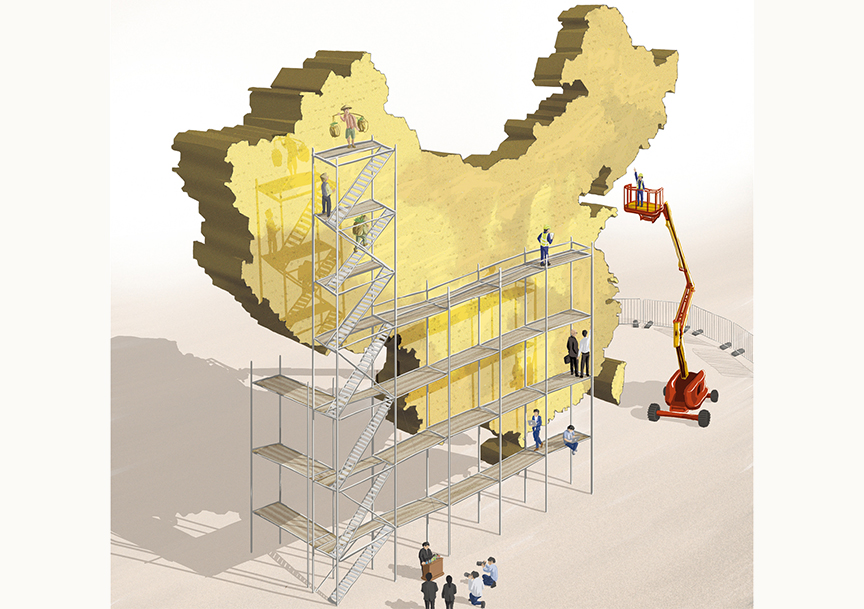Whatever problems globalization is facing, we are still one world—now more than ever, as the pandemic reminds us. The public health and economic impact of the coronavirus has been a perfect example of the high level of interconnectedness of the world today and the crucial need for cooperation and joint action by all countries and territories around the world to address it. It is just one of a range of problems and issues which both point out the inevitability of interdependence, and also reveal a widespread crisis of trust in leadership. These issues include climate change, energy, food security, disease and new technologies, with the fake news and security issues that that includes.
Globalization, characterized by the division of labor between different parts of the world and by generations of people seeking their fortunes in other countries, has overall raised prosperity levels around the world and created far more winners than losers, with the biggest winner of all unquestionably being the vast majority of China’s population. The huge numbers of Chinese people who have been pulled out of poverty during this era, a topic addressed in this issue of the magazine, is evidence of that. Meanwhile, the developed economies, especially the US, have as a result of globalization in recent decades enjoyed a huge benefit in the form of low cost products from China. One of the questions emerging from the new globalization debate is whether or not consumers would be willing to pay more for products that are produced at home. Many people believe that in the end, self-interest means that, quality being equal, people will still go for the lowest price, regardless of where products come from.
But it is true that globalization has led to the disappearance of many jobs in advanced economies, and thus bigger gaps between rich and poor, a speedup of environmental degradation and also in some cases the abuse of labor. It has created global dependencies that may need rethinking, and a reduction of the economic diversity in individual countries that is not necessarily to their advantage.
These globalization issues have been among the factors leading over the past few years to a rise in nationalism and protectionism. Brexit and the rise of Trump are often used as examples of this, but there are many others.
Governments, despite the local interests of their constituencies, have a crucial role to play in resolving these wider issues. Globalization still has much to offer the world and private enterprise clearly has a role to play, especially in the context of confrontation at the government level.
How things are going to look at the end of the coronavirus period, no one can say at this point. But a move towards a world that is fundamentally divided in two is a scenario with no positive consequences for anyone. Globalization is now a fixed and permanent part of how the world works and unraveling all of the connections is simply unthinkable.
Instead of making globalization a scapegoat for the root cause of domestic income disparities, tweaking the trend to be more inclusive to achieve a brighter future for all of humankind is a more viable option. Supply chains shift, and then shift again, throughout history, and the supply chain networks currently in place, created primarily to feed the US market, were always going to be reconfigured to serve the China and other Asian markets, as well as other changes to the global economy.
Fixing the flaws of globalization will require cooperation and detailed discussion in the spirit of goodwill and of mutual benefit, not of one side trying to beat out the other in both words and deeds. It will require compromise and the relinquishment of some strong positions and advantages in order to create a better world order which has stable sustainability. It will require a more globally-aware approach to trade and production to ensure that everyone wins, not just some. There also needs to be clear reciprocity, a unified way of handling the many points at issue by all countries. As the two largest economies in the world, the onus will to a large extent rest on the United States and China to sort all this out.
The divergence in positions between the US and China over the past few years is reflective of the urgency of addressing the issues currently undermining globalization. But calls from the US and others for China to open its markets further, just as the world opened up to China after its accession to the WTO are already being addressed to a large extent by the Chinese government, with significant changes taking place on foreign investment, particularly in the financial sector. Providing a clearer level of reciprocity would help reduce the degree of friction with other major players in the global economy. But what is certain is that there would be no winners in a real and determined decoupling between China and the US.
On the other hand, the world also needs to recognize and accept that China, which 200 years ago had been the world’s largest economy for more than 1,000 years, has its own way of operating, as does anywhere else. There needs to be a flexibility with regard to what China is. A key part of the Chinese economic structure is private enterprise, and China’s private companies and entrepreneurs do business all over the world, both to the benefit of China and to the countries in which they are operating. There is much more that they can do to encourage positive cooperation and interactions at this level.
Today, business people, including those in the US, are vital in helping to “reglobalize” the world to benefit more people, as we said in the Winter 2016 Issue of our magazine just before Trump was elected. The changes to the US government’s role on the global stage does not mean the end of globalization. This is a process which started even in ancient times, driven by people’s desire for the exchange of products and ideas, and it is something which on many levels cannot be stopped.

















